you are the product
description: a phrase indicating that if a service is free, the user's data is likely being monetised
36 results

The Death of Truth: Notes on Falsehood in the Age of Trump
by
Michiko Kakutani
Published 17 Jul 2018
Government Contracts,” Washington Post, Feb. 17, 2017; Nicholas Confessore and Danny Hakim, “Data Firm Says ‘Secret Sauce’ Aided Trump; Many Scoff,” New York Times, Mar. 6, 2017; Joshua Green and Sasha Issenberg, “Inside the Trump Bunker, with Days to Go,” Bloomberg, Oct. 27, 2016. Facebook revealed: Matthew Rosenberg and Gabriel J.X. Dance, “ ‘You Are the Product’: Targeted by Cambridge Analytica on Facebook,” New York Times, Apr. 8, 2018; Carole Cadwalladr and Emma Graham-Harrison, “Revealed: 50 Million Facebook Profiles Harvested for Cambridge Analytica in Major Data Breach,” Guardian, Mar. 17, 2018; Olivia Solon, “Facebook Says Cambridge Analytica May Have Gained 37m More Users’ Data,” Guardian, Apr. 4, 2018.
…
Pomerantsev, Peter, Nothing Is True and Everything Is Possible (New York: PublicAffairs, 2015). Remnick, David, “A Hundred Days of Trump,” New Yorker, May 1, 2017. Ricks, Thomas E., Fiasco: The American Military Adventure in Iraq (New York: Penguin Press, 2006). Rosenberg, Matthew, and Gabriel J.X. Dance, “ ‘You Are the Product’: Targeted by Cambridge Analytica on Facebook,” New York Times, Apr. 8, 2018. Snyder, Timothy, On Tyranny (New York: Tim Duggan Books, 2017). Stanley, Jason, How Propaganda Works (Princeton, N.J.: Princeton University Press, 2015). Timberg, Carl, Karla Adam and Michael Kranish, “Bannon Oversaw Cambridge Analytica’s Collection of Facebook Data, According to Former Employee,” Washington Post, Mar. 20, 2018.
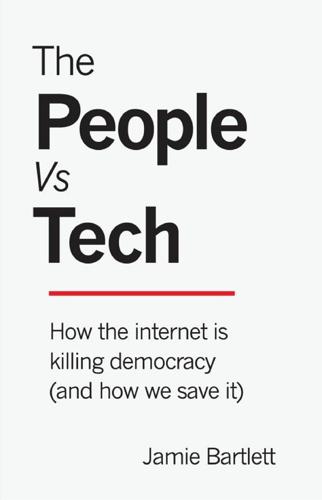
The People vs Tech: How the Internet Is Killing Democracy (And How We Save It)
by
Jamie Bartlett
Published 4 Apr 2018
It was the first time two computers had remotely communicated, and the ‘ARPANET’ was born. A decade and a few adjustments later this government research project had a new name: the internet. Notes Chapter 1: The New Panopticon 1 William Davies, The Happiness Industry (Verso, 2015), gives a very good overview of these early days. 2 John Lanchester, ‘You are the product’, London Review of Books, 17 August 2017. 3 Elizabeth Stinson, ‘Stop the Endless Scroll. Delete Social Media From Your Phone’, www.wired.com, 1 October 2017. 4 Adam Alter, Irresistible (Penguin Press, 2017). 5 Matt Richtel, ‘Are Teenagers Replacing Drugs With Smartphones?’, New York Times, 13 March 2017. 6 Adam Alter, Irresistible. 7 Tristan Harris, ‘How Technology is Hijacking Your Mind – from a Magician and Google Design Ethicist’, www.thriveglobal.com, 18 May 2016. 8 Robert Gehl, ‘A History of Like’, https://thenewinquiry.com, 27 March 2013. 9 Kathy Chan, ‘I like this’, www.facebook.com, 10 February 2009. 10 Tom Huddleston Jnr, ‘Sean Parker Wonders What Facebook Is “Doing to Our Children’s Brains”’, www.fortune.com, 9 November 2017. 11 Natasha Singer, ‘Mapping, and Sharing, the Consumer Genome’, New York Times, 16 June 2012. 12 Michal Kosinski, David Stillwell, and Thore Graepel (2013), ‘Private traits and attributes are predictable from digital records of human behaviour’, PNAS, 110 (15), 5802–5805. 13 Sam Levin, ‘Facebook told advertisers it can identify teens feeling “insecure” and “worthless”’, Guardian, 1 May 2017. 14 Dave Birch, ‘Where are the customer’s bots?’
…
President Theodore Roosevelt used the 1890 Sherman Act in his first term, which fined monopolies, to break up Rockefeller’s Standard Oil Trust. He wanted to make sure massive monopolies could be controlled to act in the public interest. He worried about ‘wealthy and economically powerful men whose chief object is to hold and increase their power’. Lanchester, ‘You are the product’. Frankin Foer, World Without Mind (Jonathan Cape, 2017) p.191. 11 Foer, World Without Mind, p. 114 12 You find the petition on the www.change.org web page under ‘Save Your Uber’. 13 The Uber Privacy Policy is available on their website. https://privacy.uber.com/policy 14 This website is archived at www.web.archive.org.
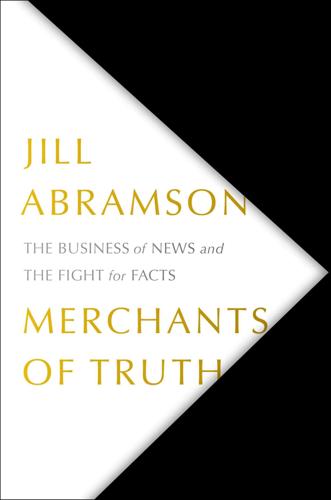
Merchants of Truth: The Business of News and the Fight for Facts
by
Jill Abramson
Published 5 Feb 2019
With the exception of Rupert Murdoch: Nicholas Thompson and Fred Vogelstein, “Inside the Two Years That Shook Facebook—and the World,” Wired, February 12, 2018, https://www.wired.com/story/inside-facebook-mark-zuckerberg-2-years-of-hell/. Zuckerberg’s early backer: John Lanchester, “You Are the Product,” London Review of Books 39, no. 16 (August 17, 2017), https://www.lrb.co.uk/v39/n16/john-lanchester/you-are-the-product. When Girard died in 2015: Quentin Hardy, “René Girard, French Theorist of the Social Sciences, Dies at 91,” New York Times, November 10, 2015, https://www.nytimes.com/2015/11/11/arts/international/rene-girard-french-theorist-of-the-social-sciences-dies-at-91.html.
…
utm_term=.f7d8e787ed34; Max Read, “Does Even Mark Zuckerberg Know What Facebook Is?,” New York, October 1, 2017, http://nymag.com/selectall/2017/10/does-even-mark-zuckerberg-know-what-facebook-is.html. When the network welcomed: John Lanchester, “You Are the Product,” London Review of Books 39, no. 16 (August 17, 2017), https://www.lrb.co.uk/v39/n16/john-lanchester/you-are-the-product. Sixty-two percent of Americans: Elisa Shearer and Jeffrey Gottfried, “News Use across Social Media Platforms 2017,” Pew Research Center/Journalism.org, September 7, 2017, http://www.journalism.org/2017/09/07/news-use-across-social-media-platforms-2017/.
…
In 2010 opponents of a Florida: “Case Study: Reaching Voters with Facebook Ads (Vote No on 8),” Facebook, August 16, 2011, https://www.facebook.com/notes/us-politics-on-facebook/case-study-reaching-voters-with-facebook-ads-vote-no-on-8/10150257619200882. Around 2012 the company set out: John Lanchester, “You Are the Product,” London Review of Books 39, no. 16 (August 17, 2017), https://www.lrb.co.uk/v39/n16/john-lanchester/you-are-the-product. In the cloisters of Cambridge University: Jane Mayer, “The Reclusive Hedge-Fund Tycoon behind the Trump Presidency,” New Yorker, March 27, 2017, https://www.newyorker.com/magazine/2017/03/27/the-reclusive-hedge-fund-tycoon-behind-the-trump-presidency.
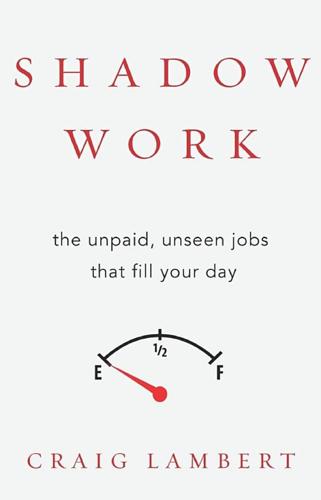
Shadow Work: The Unpaid, Unseen Jobs That Fill Your Day
by
Craig Lambert
Published 30 Apr 2015
Facebook had reframed his joking comment as an endorsement, a sponsored story—without, of course, consulting Bergus. He confessed on his blog that he was “mildly annoyed,” but added, “I know the costs of using Facebook. It does not cost me money. It uses lots of my personal information.” As the Internet-era proverb warns: If you aren’t paying for the product, you are the product. When Facebook went public in 2012 (the company had valued itself at $104 billion, though the public offering sold only $16 billion worth of stock), some of its users publicly asked, “Where’s our cut?” They recognized that shadow work by the site’s users had created the value that founder Mark Zuckerberg and his business partners sold to investors.
…
It also spins off a nice by-product for OkCupid: a rich harvest of digital info. Fee-based services like Match.com and eHarmony charge monthly rates. Free services like OkCupid earn their money from advertisers rather than members. (Here again, the maxim applies: If you aren’t paying for the product, you are the product.) Fee-based or free, online dating services all require customers to cough up data for their formulas. Theories of romance are embedded in these algorithms. The classic advice that “opposites attract,” for example, gains few adherents here: The algorithms almost always match people with similar outlooks, values, and beliefs, not opposite ones.
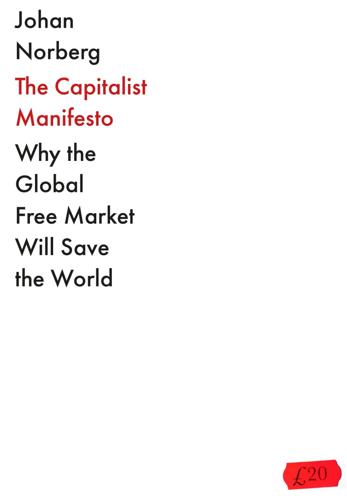
The Capitalist Manifesto
by
Johan Norberg
Published 14 Jun 2023
Half of its critics are angry that too much content is censored; the other half are complaining that too little is deleted, allowing hate and lies to spread wildly. The Left thinks these are platforms for right-wing lunatics and disinformation, the Right thinks they are politically correct leftists who invented cancel culture. Many are angry at Apple for charging too much or at Facebook and Google for not charging (‘then you are the product’). At best, social media is just a stupid waste of time. At worst it is a machine that creates polarization, filter bubbles, loneliness and social pressure, and exists only to glue our eyeballs to ads. Whatever you think about these companies, when you look at how many of us flock to their platforms and what we state that we like about them, there is no doubt that they have created enormous value.
…
If you included just these three services in US GDP per capita by the price people would be willing to pay, the average American would suddenly appear to be 50 per cent richer.21 These tech giants have created products of absolutely enormous value that they give to us for almost nothing. Yes, to repeat, ‘if you do not pay for it, you are the product’. We’ve all heard it (and I’ve said it myself) again and again. But if the cost of something I would have paid tens of thousands of dollars for is only that I have to look at ads that are a little more relevant than the ones I saw before, it’s a pretty good deal. Most people seem to think so – and if they don’t they are free to abstain.

Rentier Capitalism: Who Owns the Economy, and Who Pays for It?
by
Brett Christophers
Published 17 Nov 2020
This, it transpires, is exactly the situation in which Intu finds itself at the time of this writing: across the UK, bricks-and-mortar retail has been losing business to the Internet, with deleterious consequences for Intu’s business model. See, for example, R. Millard, ‘Embattled Intu worth just £65m as losses widen to £2bn’, Telegraph, 12 March 2020. 5. Alphabet Inc., ‘Annual Report for the Fiscal Year Ended December 31, 2018’, p. 27 – pdf available at abc.xyz. 6. J. Lanchester, ‘You Are the Product’, London Review of Books 39: 16 (2017). 7. Facebook, Inc., ‘Annual report for the fiscal year ended December 31, 2018’, p. 35 – pdf available at investor.fb.com. 8. C. Forde, M. Stuart, S. Joyce, L. Oliver, D. Valizade, G. Alberti, K. Hardy, V. Trappmann, C. Umney and C. Carson, ‘The Social Protection of Workers in the Platform Economy’, November 2017, p. 25 – pdf available at europarl.europa.eu. 9.
…
Stafford, ‘All About Data: LSE Bids Show Exchanges’ New Priorities’, Financial Times, 22 October 2019. 15. Economist, ‘The London Stock Exchange Is Thriving Despite Brexit’, 9 March 2019. 16. One zettabyte = 1 trillion gigabytes, or 1021 bytes. IDC, ‘The Digital Universe of Opportunities: Rich Data and the Increasing Value of the Internet of Things’, April 2014, at emc.com. 17. Lanchester, ‘You Are the Product’. On the surveillance business of contemporary digital capitalism more broadly, see S. Zuboff, The Age of Surveillance Capitalism (London: Profile, 2019). 18. ‘Datafication’ is the term used by Jathan Sadowski in his ‘When Data Is Capital: Datafication, Accumulation, and Extraction’, Big Data & Society, doi: 10.1177/2053951718820549. 19.
…
It should be noted that nobody paying attention to the real world would believe labour markets to be competitive in the first place. 68. Ibid., p. 601. 69. D. Coyle, ‘Precarious and Productive Work in the Digital Economy’, National Institute Economic Review 240: 1 (2017), pp. R5–R14, at p. R12. 70. Lanchester, ‘You Are the Product’. 71. I will explicitly examine the implications of outsourcing for workers – and not just digital-platform workers – in the following chapter. 72. ‘Social Media’s Dirty Secret: Workers in the Developing World Screen Graphic Content for Facebook and Google’, 6 May 2018, at cbc.ca. 73. S.
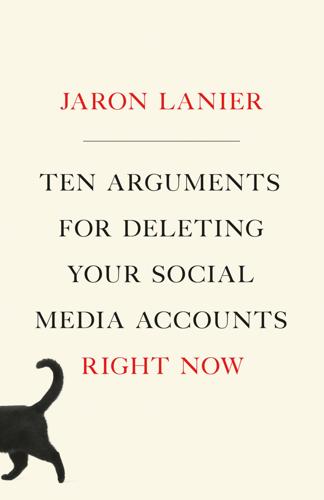
Ten Arguments for Deleting Your Social Media Accounts Right Now
by
Jaron Lanier
Published 28 May 2018
Facebook researchers have practically bragged9 that they could make people unhappy without the people realizing why.10 Why promote something like that as a great research result? Wouldn’t it be damaging to Facebook’s brand image? The reason might have been that it was great publicity for reaching the true customers, those who pay to manipulate. The ones who are manipulated, meaning you, are the product, not the customer. More recently, Facebook researchers finally acknowledged11 what other researchers have found: that their products can do real harm. What really bugs me about the way social media companies talk about this problem is that they’ll say, “Sure we make you sad, but we do more good in the world than harm.”
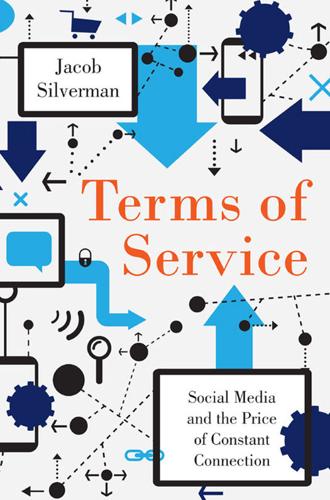
Terms of Service: Social Media and the Price of Constant Connection
by
Jacob Silverman
Published 17 Mar 2015
Through these and other measures, corporations ask us to join in the marketing process, to become advertisers alongside them and on their behalf, just as Facebook and Google do with their various sponsored stories strategies. By clicking like or favorite, or retweeting a promoted tweet, a user becomes a vector in the spreading of advertising. You are selling both a product and your networked persona; in many ways, you are the product, particularly when it’s your data being sold to advertisers and other unknown partners. This is what’s so problematic about ad-supported social networks. Like viral media, the line between advertising and honest expression is continually blurred, sometimes to the point where they become one and the same.
…
When you pass around a video of a college student who catches fire while trying to twerk, a range of actors are making money: your Internet service provider; the video site hosting it and its ad partners; the social networks monitoring your sharing habits; the television show that commissioned the video and designed it, like so much viral material, to look like a candid amateur video. The only person not making money in this arrangement is you, and you did some promotional work by sharing/publishing the video. “If you’re not paying for the product, you are the product,” according to one popular digital-age axiom. It’s a bit glib, but there’s truth in it. The spread of so many free services and so much free content has led to the idea that the Internet is as much a place of economic freedom as it is one of personal freedom. But because we pay for so little that we do online, we’re forced to pay in other ways: being tracked, submitting to video ads before we can watch TV shows, having our personal data bought and sold, liking brand pages so that we can access exclusive content or giveaways.
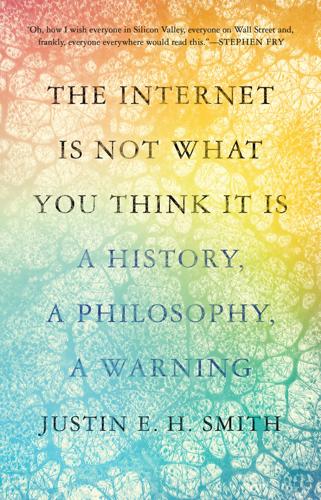
The Internet Is Not What You Think It Is: A History, a Philosophy, a Warning
by
Justin E. H. Smith
Published 22 Mar 2022
By treating the internet as a short-term problem-solver, we created for ourselves some new, very big problems; by allowing the internet to compel us to attend to a constant stream of different, trivial things, we have become unable to focus on the monolithically important thing that it is. 1 A Sudden Acceleration In 2010 you could say something like “if it’s free, you are the product” and feel smart for a full year. These days you need to say something like that every few hours. —DON HUGHES1 “Internet, c’est vraiment du Leibniz sans Dieu” [“The internet: it really is Leibniz minus God”]. —MICHEL SERRES2 Our Critical Moment The earth has moved under our feet in just the past few decades.
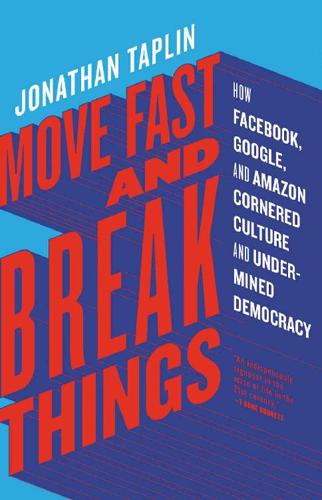
Move Fast and Break Things: How Facebook, Google, and Amazon Cornered Culture and Undermined Democracy
by
Jonathan Taplin
Published 17 Apr 2017
Before I continue with Zuckerberg’s story, I want to pause to ponder just why his invention created such a profound shift in the world of communication. Facebook is changing the norms of what it means to be private, what it means to be a kid, and what it means to be a “human product.” As the phrase goes, if you are not paying for it, you are not the customer, you are the product. Perhaps Mark Zuckerberg’s greatest insight was that the human desire to be “liked” was so strong that Facebook’s users would create all the content on the site for free. In 2014, Facebook’s 1.23 billion regular users logged in to the site for seventeen minutes each day—as the New York Times pointed out.

Stories Are Weapons: Psychological Warfare and the American Mind
by
Annalee Newitz
Published 3 Jun 2024
Rosenberg, Confessore, and Cadwalladr, “How Trump Consultants Exploited.” 8. Wylie, Christopher, Mindf*ck: Cambridge Analytica and the Plot to Break America (Verbena Limited, 2019). 9. “Big Five Personality Test,” Open-Source Psychometrics Project, August 2, 2019. 10. Rosenberg, Matthew, and Gabriel J. X. Dance, “ ‘You Are the Product’: Targeted by Cambridge Analytica on Facebook,” New York Times, April 8, 2018. 11. Cadwalladr, “I Made Steve Bannon’s Psychological Warfare Tool.” 12. Jones, D. N., and D. L. Paulhus, “Introducing the Short Dark Triad (SD3): A Brief Measure of Dark Personality Traits,” Assessment 21, no. 1 (2014): 28–41. 13.

The Midnight Library
by
Matt Haig
Published 12 Aug 2020
And in a few moments, she wasn’t. God and Other Librarians ‘Who are you?’ ‘You know my name. I am Mrs Elm. Louise Isabel Elm.’ ‘Are you God?’ She smiled. ‘I am who I am.’ ‘And who is that?’ ‘The librarian.’ ‘But you aren’t a real person. You’re just a . . . mechanism.’ ‘Aren’t we all?’ ‘Not like that. You are the product of some strange interaction between my mind and the multiverse, some simplification of the quantum wave function or whatever it is.’ Mrs Elm looked perturbed by the suggestion. ‘What is the matter?’ Nora thought of the polar bear as she stared down at the yellow-brown stone floor. ‘I nearly died.’
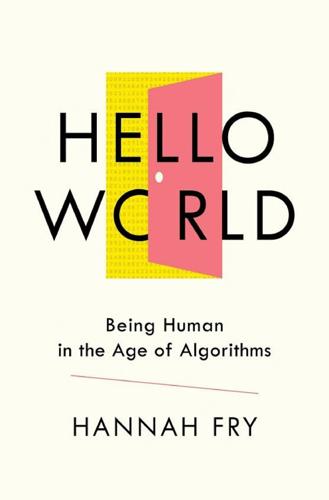
Hello World: Being Human in the Age of Algorithms
by
Hannah Fry
Published 17 Sep 2018
If you give it your consent (and 80 per cent of customers do), it will sell on an anonymized version of your genetic data to those aforementioned research partners for a tidy profit.56 The money earned isn’t a happy bonus for the company; it’s actually their business plan. One 23andMe board member told Fast Company: ‘The long game here is not to make money selling kits, although the kits are essential to get the base level data.’ Something worth remembering whenever you send off for a commercial genetic report: you’re not using the product; you are the product.57 Word of warning. I’d also be a bit wary of those promises of anonymity. In 2005 a young man,58 conceived through a completely anonymous sperm donor, managed to track down and identify his birth father by sending off a saliva swab to be analysed and picking up on clues in his own DNA code.59 Then in 2013 a group of academics, in a particularly famous paper, demonstrated that millions of people could potentially be identified by their genes using nothing more than a home computer and a few clever internet searches.60 And there’s another reason why you might not want your DNA in any dataset.
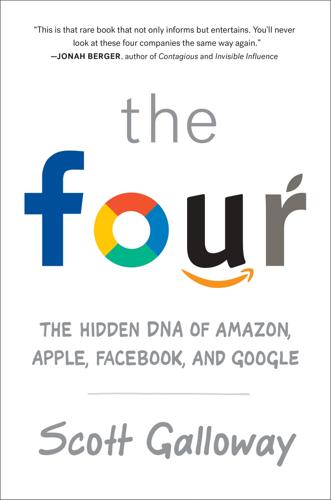
The Four: How Amazon, Apple, Facebook, and Google Divided and Conquered the World
by
Scott Galloway
Published 2 Oct 2017
You get to hide behind freedom of speech, even if you have a crowded theater and someone yells “Fire!” Fear and outrage? All the better. Facebook has good reason not to see itself as a media company. It’s too much work and would introduce friction to growth. And that’s something the Four don’t do. Utopia/Dystopia Media platforms where you are the product have empowered, connected, and facilitated greater empathy among billions of people. The shift in value from old-media to new-media firms will result in job destruction and, as with any upheaval, risks. The greatest threats to modern civilization have come from people and movements who had one thing in common: controlling and perverting the media to their own devices in the absence of a fourth estate that was protected from intimidation and expected to pursue the truth.
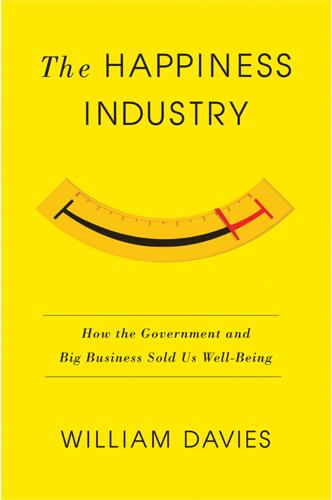
The Happiness Industry: How the Government and Big Business Sold Us Well-Being
by
William Davies
Published 11 May 2015
The solution consists of a range of coaching programmes, combined with ‘behavioural activation’ courses, aimed at restoring the unemployed individual’s self-belief and optimism with ruthless efficiency. As one participant in an A4e course reported, they were shouted at by a self-help guru to ‘talk, breathe, eat, shit belief in yourself’ and that ‘you are the product – you either believe it or you don’t’.15 Wherever the economics of mental health become more explicit, the gap between care and punishment tends to shrink. In 2007, the economist Richard Layard laid out the ‘business case’ for cognitive behavioural therapy (CBT), demonstrating that it could save the UK government money, given the treatment’s brevity and apparent success rate in keeping people in work.16 This was instrumental in the creation of the Increasing Access to Psychological Therapies programme, which involved a dramatic rise in the number of cognitive behavioural therapists trained and employed by the National Health Service.

Critical Failures (Caverns and Creatures Book 1)
by
Robert Bevan
Published 4 Jun 2012
“It means that one of your parents was an elf, and the other was a human. You’ve probably got some emotional issues.” “About what?” “About whether you identify more with your elven or human side, about how neither side completely accepts you as one of their own,” Chaz paused, and then added solemnly “And there’s the possibility that you are the product of rape.” Katherine looked at him incredulously. “Where are you getting this bullshit?” “Back when I used to play these games, I read some of the novels that were written by-” He was interrupted by Katherine’s laughter. “What’s so funny?” “The thought of you reading a book.” “I read a lot of-” “That fire isn’t going to last very long,” Katherine said.
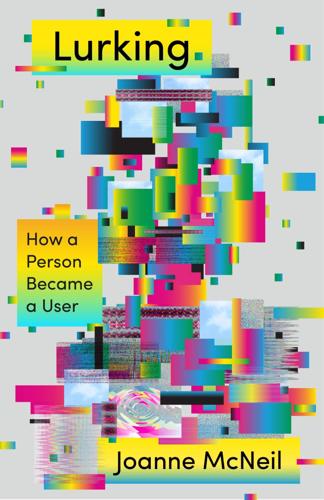
Lurking: How a Person Became a User
by
Joanne McNeil
Published 25 Feb 2020
But Ello had ideals; it was elastic about usernames, ad-free, and pro-user—at least, according to the social network’s “manifesto,” which read as follows: Every post you share, every friend you make and every link you follow is tracked, recorded and converted into data. Advertisers buy your data so they can show you more ads. You are the product that’s bought and sold. We believe there is a better way. We believe in audacity. We believe in beauty, simplicity and transparency. We believe that the people who make things and the people who use them should be in partnership. We believe a social network can be a tool for empowerment. Not a tool to deceive, coerce and manipulate—but a place to connect, create and celebrate life.
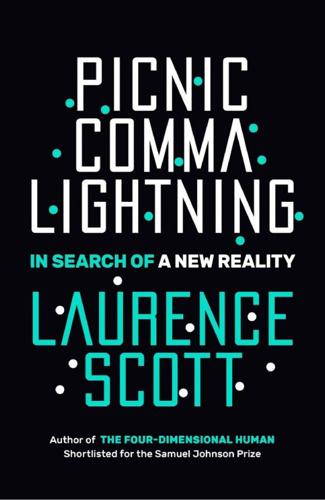
Picnic Comma Lightning: In Search of a New Reality
by
Laurence Scott
Published 11 Jul 2018
Epilogue: Unoriginal Features 1 ‘With time we …’, Simone Weil, Gravity and Grace, trans. Emma Crawford and Mario von der Ruhr (London: Routledge, 2002 [1947]). 2 ‘The biggest thing …’, Antonio García Martinez, Chaos Monkeys: Inside the Silicon Valley Money Machine (London: Ebury, 2017), quoted in John Lanchester, ‘You Are the Product’, London Review of Books, 17th August 2017. ACKNOWLEDGEMENTS IMMENSE THANKS ARE due to Tom Avery, for his editorial guidance, imagination, and for keeping things real. Many thanks to Anna Argenio and Kate McQuaid, and everyone at William Heinemann. Tom Mayer at W.W. Norton has been a wonderful champion of this book, and of my writing in general, in the United States.
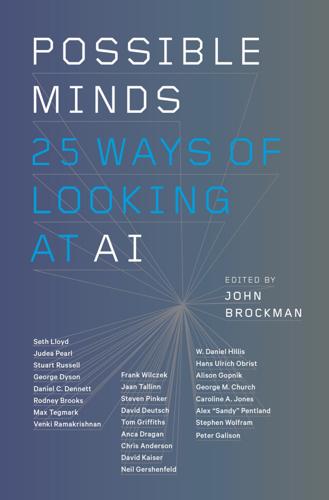
Possible Minds: Twenty-Five Ways of Looking at AI
by
John Brockman
Published 19 Feb 2019
Moreover, they have the financial resources to hire the most talented workers in the field, enhancing their power even further. We have been giving away valuable data for the sake of freebies like Gmail and Facebook, but as the journalist and author John Lanchester has pointed out in the London Review of Books, if it is free, then you are the product. Their real customers are the ones who pay them for access to knowledge about us, so that they can persuade us to buy their products or otherwise influence us. One way around the monopolistic control of data is to split the ownership of data away from firms that use them. Individuals would instead own and control access to their personal data (a model that would encourage competition, since people would be free to move their data to a company that offered better services).
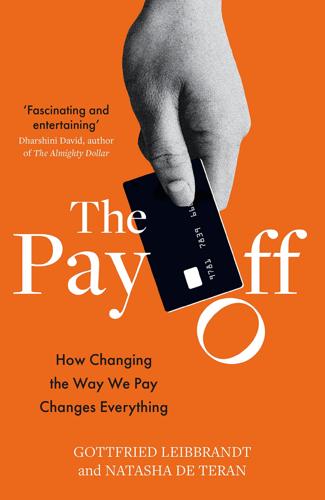
The Pay Off: How Changing the Way We Pay Changes Everything
by
Gottfried Leibbrandt
and
Natasha de Teran
Published 14 Jul 2021
This isn’t the only way in which our payments data could potentially prove remunerative. Providers of payment services could follow the Facebook model of using our data to create targeted marketing and advertising – or selling it to third parties to enable them to do so. We might prefer to pay for our payments with data rather than money: as the saying goes, ‘if it’s free, you are the product’. What Alipay and Tenpay have done is little different from the approach long used by banks, the traditional custodians of our payment records. Banks have always used our payments data to their advantage – offering us premium accounts, credit cards and saving vehicles when they’ve seen our income rise; mortgages and pension products when we’ve reached a certain age; loans and overdrafts when we’re caught short.
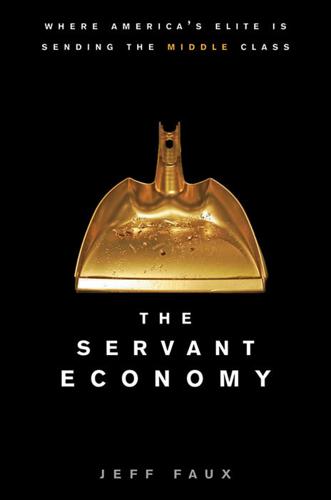
Servant Economy: Where America's Elite Is Sending the Middle Class
by
Jeff Faux
Published 16 May 2012
And just what are the “people” skills that are required for the personal-service future? They do not require a degree in communication science or psychology. They are not the skills of marketing or salesmanship that enable you to persuade customers that your product fits their needs. In a high-unemployment, personal-service economy, you are the product, and you must make yourself attractive, accommodating, and pleasing. These are the skills of ingratiation. The boss always has the upper hand, of course. But in a mine, a factory, an office, or a hospital there is a generally recognized line between doing a good job and having to satisfy the boss’s personal whims.
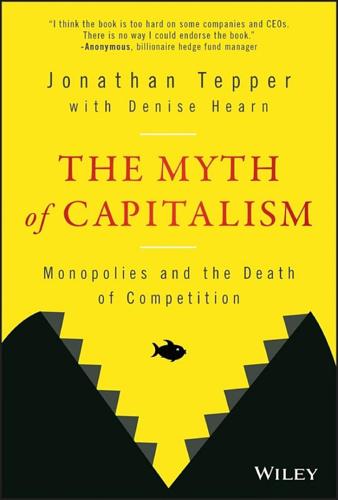
The Myth of Capitalism: Monopolies and the Death of Competition
by
Jonathan Tepper
Published 20 Nov 2018
Bill Gates, in a 1994 email, wrote, “We should wait until we have a way to do a high level of integration that will be harder for likes of Notes, WordPerfect to achieve, and which will give Office a real advantage … . We can't compete with Lotus and WordPerfect/Novell without this.” 22. http://gs.statcounter.com/social-media-stats. 23. https://marketingland.com/emarketer-facebook-dominate-15-9-pct-digital-ad-spend-growth-2017-209045. 24. https://www.lrb.co.uk/v39/n16/john-lanchester/you-are-the-product. 25. http://gawker.com/5636765/facebook-ceo-admits-to-calling-users-dumb-fucks. 26. http://ec.europa.eu/competition/antitrust/cases/dec_docs/39740/39740_14996_3.pdf. 27. http://www.antitrustinstitute.org/files/Google_DoubleClick_memo_110620071437.pdf. 28. http://fortune.com/2017/04/26/google-facebook-digital-ads/. 29. https://www.reuters.com/article/fitch-affirms-dean-foods-idr-at-bb-withd/fitch-affirms-dean-foods-idr-at-bb-withdraws-all-ratings-idUSFit8kPvMh. 30. https://www.agweb.com/article/dfa_agrees_to_pay_140_million_in_milk-price_fixing_lawsuit/ and https://hoards.com/blog-1936-dean-foods-will-pay-$30-million-after-northeast-price-fixing-lawsuit.html. 31. https://www.foodengineeringmag.com/articles/91700-dean-foods-dairy-farmers-of-america-and-national-dairy-holdings-antitrust-lawsuit-reinstated. 32. http://thehill.com/blogs/congress-blog/economy-budget/241697-the-catalyst-that-transformed-freight-rail-transport. 33. https://www.economist.com/news/briefing/21695385-profits-are-too-high-america-needs-giant-dose-competition-too-much-good-thing. 34. http://consumerfed.org/wp-content/uploads/2015/10/Bulk-Commodities-and-the-Rails.pdf. 35. https://ageconsearch.umn.edu/bitstream/164478/2/Concentration.pdf. 36. http://fortune.com/2014/06/26/monsanto-gmo-crops/. 37. https://www.reuters.com/article/us-monsanto-m-a-bayer-antitrust/bayers-monsanto-acquisition-to-face-politically-charged-scrutiny-idUSKCN11K2LG. 38. https://www.eteknix.com/amd-gain-intelpassmarkq3/. 39. https://www.nytimes.com/2017/09/06/business/intel-eu-antitrust-fine.html. 40.
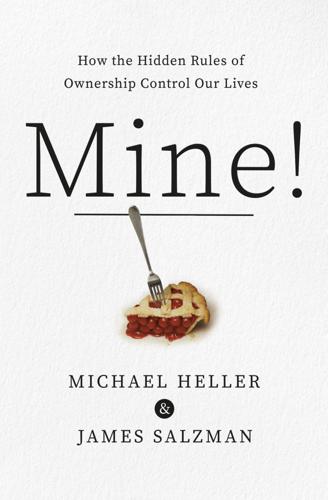
Mine!: How the Hidden Rules of Ownership Control Our Lives
by
Michael A. Heller
and
James Salzman
Published 2 Mar 2021
Shoshana Zuboff has named this business model “surveillance capitalism.” As one economist puts it bluntly: “Imagine if General Motors did not pay for its steel, rubber or glass—its inputs. That’s what it’s like for the big internet companies. It’s a sweet deal.” This is why so many apps are free. But as tech articles repeat: when the app is free, you are the product. The Wild West of no-ownership works for fashion, jokes, and sports plays, but not so well for genes, locations, faces, and clickstreams. What’s the difference? Perhaps it’s that all these types of data share a common thread, one central to ownership design today: individually they count for little, but collectively they are worth everything.
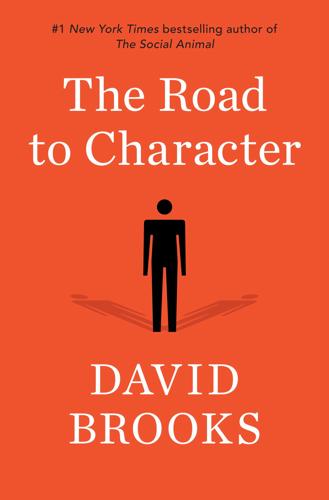
The Road to Character
by
David Brooks
Published 13 Apr 2015
People subtly start comparing themselves to other people’s highlight reels, and of course they feel inferior. The Soul of Man Under Meritocracy The purification of the meritocracy has also reinforced the idea that each of us is wonderful inside. It has also encouraged self-aggrandizing tendencies. If you have lived through the last sixty or seventy years, you are the product of a more competitive meritocracy. You have, like me, spent your life trying to make something of yourself, trying to have an impact, trying to be reasonably successful in this world. That’s meant a lot of competition and a lot of emphasis on individual achievement—doing reasonably well in school, getting into the right college, landing the right job, moving toward success and status.
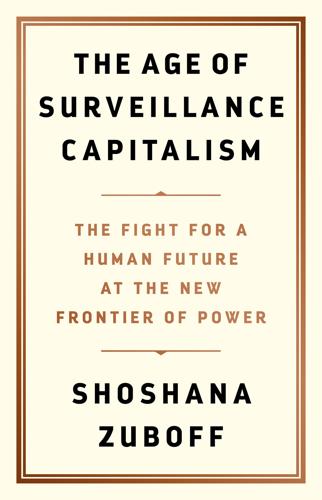
The Age of Surveillance Capitalism
by
Shoshana Zuboff
Published 15 Jan 2019
They do not establish constructive producer-consumer reciprocities. Instead, they are the “hooks” that lure users into their extractive operations in which our personal experiences are scraped and packaged as the means to others’ ends. We are not surveillance capitalism’s “customers.” Although the saying tells us “If it’s free, then you are the product,” that is also incorrect. We are the sources of surveillance capitalism’s crucial surplus: the objects of a technologically advanced and increasingly inescapable raw-material-extraction operation. Surveillance capitalism’s actual customers are the enterprises that trade in its markets for future behavior.
…
Although Big Other can mimic intimacy through the tireless devotion of the One Voice—Amazon-Alexa’s chirpy service, Google Assistant’s reminders and endless information—do not mistake these soothing sounds for anything other than the exploitation of your needs. I think of elephants, that most majestic of all mammals: Big Other poaches our behavior for surplus and leaves behind all the meaning lodged in our bodies, our brains, and our beating hearts, not unlike the monstrous slaughter of elephants for ivory. Forget the cliché that if it’s free, “You are the product.” You are not the product; you are the abandoned carcass. The “product” derives from the surplus that is ripped from your life. Big Other finally enables the universal technology of behavior that, as Skinner, Stuart MacKay, Mark Weiser, and Joe Paradiso each insisted, accomplishes its aims quietly and persistently, using methods that intentionally bypass our awareness, disappearing into the background of all things.
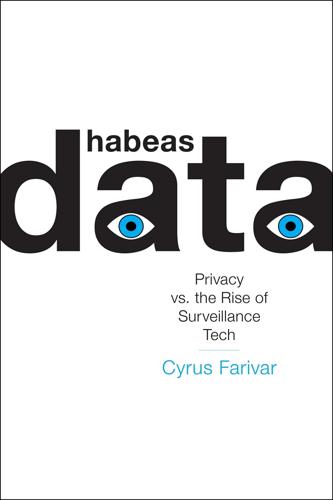
Habeas Data: Privacy vs. The Rise of Surveillance Tech
by
Cyrus Farivar
Published 7 May 2018
When Gmail debuted, Levison, then a political science student at Southern Methodist University, was doing some contract work here and there, but he wanted to do his own thing. And from the beginning of Gmail, Levison was disturbed by the entire business model behind the free service. After all, there’s an old adage about tech companies: “If you’re not paying for the product, you are the product.” In other words, while Gmail didn’t charge users for the service, Google routinely scans all messages and sells ads against them as a way to make money. So, Nerdshack (which would eventually change its name to Lavabit), was born. “I didn’t like the idea that Google was going to be profiling people’s private messages for advertising,” Levison said.
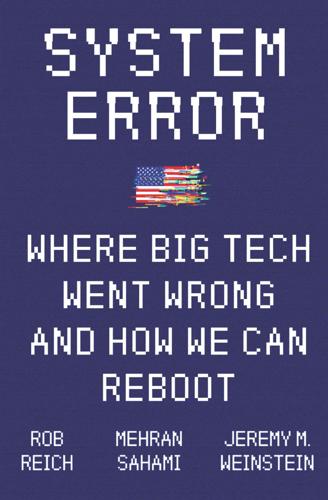
System Error: Where Big Tech Went Wrong and How We Can Reboot
by
Rob Reich
,
Mehran Sahami
and
Jeremy M. Weinstein
Published 6 Sep 2021
He grew more disturbed as he learned that the patchwork of regulations that did exist had largely been designed by the very companies that were benefiting most from the monetization of people’s personal information. His journey of self-discovery revealed something that is now widely understood: if you’re not paying for the product, you are the product. The real customers of many of the big tech companies are the advertisers, and what they’re paying for is the ability to target their messages ever more precisely to consumers, based on their interests, preferences, and desires. Mactaggart was incensed. He learned that the Obama administration had proposed a “consumer-privacy bill of rights” in 2012 that had fallen victim to the Snowden revelations as the government had lost its momentum and moral authority to drive reforms on data protection.
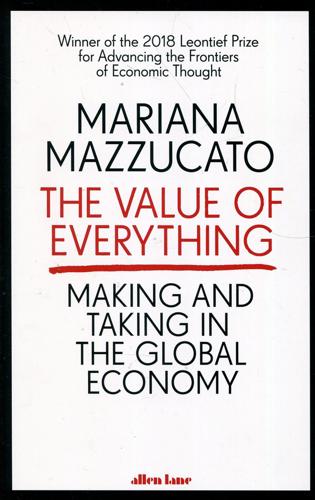
Value of Everything: An Antidote to Chaos The
by
Mariana Mazzucato
Published 25 Apr 2018
Rather, it is users who provide Google with necessary inputs for its production process: their looks on ads and, most importantly, their personal data. In return, they obtain online searches and other services. The bulk of Google's profits come from selling advertising space and users' data to firms. If something is free online, you are not the customer, you are the product.64 Facebook's and Google's business models are built on the commodification of personal data, transforming through the alchemy of a two-sided market our friendships, interests, beliefs and preferences into sellable propositions. The so-called ‘sharing economy' is based on the same idea. For all the hype about ‘sharing', it is less about altruism and more about allowing market exchange to reach into areas of our lives - our homes, our vehicles, even our private relationships - that were previously beyond its scope and to commodify them.65 As Evgeny Morozov has warned, it risks turning us all into ‘perpetual hustlers',66 with all of our lives up for sale, while at the same time undermining the basis for stable employment and a good standard of living.
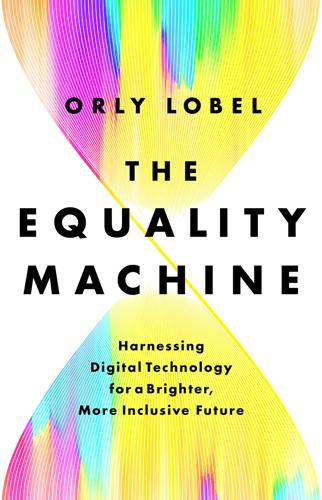
The Equality Machine: Harnessing Digital Technology for a Brighter, More Inclusive Future
by
Orly Lobel
Published 17 Oct 2022
But self-studies carry the danger of being self-serving, a way to convince legislators and regulators—alongside the public—to support their growth and preclude regulation. We have seen up close throughout this book how we are rapidly making ourselves more readable by machines. This inevitably gives for-profit corporations and those in power more ways to exploit, manipulate, and harm those with less power. If you are not paying for the product, you are the product. Not only do we need to allow for more researchers and policymakers to have access to data, we need to continuously require it. Companies should be legally required to take specific constructive actions and make their research available for public audits. Law and policy should play a more robust role at all stages of technological change.
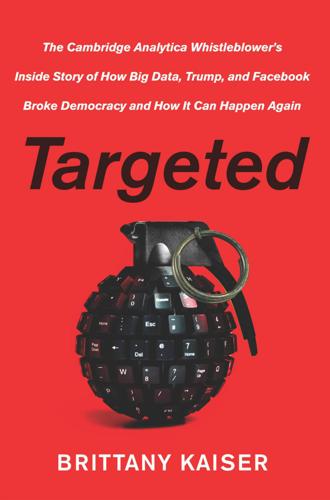
Targeted: The Cambridge Analytica Whistleblower's Inside Story of How Big Data, Trump, and Facebook Broke Democracy and How It Can Happen Again
by
Brittany Kaiser
Published 21 Oct 2019
Call and write to your legislators (you can find their details at https://www.usa.gov/elected-officials) and tell them that you support new, common-sense data-protection legislation, including the following pending bills and initiatives currently being debated, both in Congress and in the court of public opinion: Senator Ed Markey’s CONSENT Bill would flip the script, requiring companies to obtain opt-in consent from users (rather than their being automatically opted in), develop reasonable data security practices, and notify users about all data collection and any data breaches. Senator Elizabeth Warren’s Corporate Executive Accountability Act would make corporate executives criminally liable for data breaches that occur as a result of negligence, as in the Equifax and Facebook data breaches. Jim Steyer’s “You Are the Product” Legislative Initiative would enshrine legal recourse for abuse of your data and ownership rights. The related bill(s) have not yet dropped but are something to look out for, given that Jim and the Californians for Consumer Privacy were instrumental in translating GDPR into the California Consumer Privacy Act (CCPR), the most comprehensive data legislation in the United States.
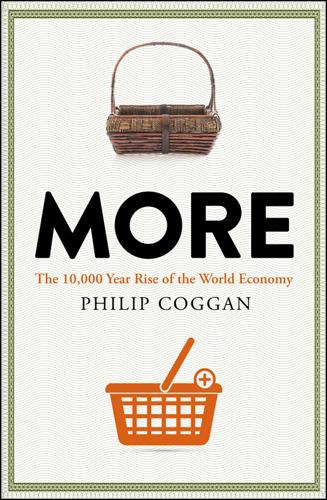
More: The 10,000-Year Rise of the World Economy
by
Philip Coggan
Published 6 Feb 2020
And Amazon’s sheer scale means that it can undercut rival retailers, on price and on delivery. However, the monopoly power that these companies have attained has caused a “techlash”. People have started to worry about the Faustian bargain involved in giving personal information to corporate giants; as the saying goes, if you are being given a free service, that is because you are the product. Inevitably, the internet has been used to promote offensive views and hateful threats, and the tech companies have been accused of doing too little to prevent this. They have also been criticised for the way they have organised their tax affairs. Many have sited key parts of their organisations in low-tax regimes and they appear to make very little profit (and thus pay very little tax) in the bigger European states.
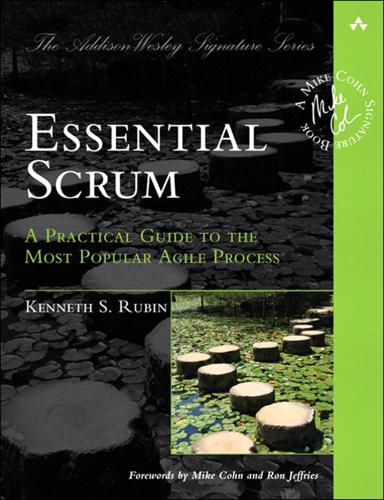
Essential Scrum: A Practical Guide to the Most Popular Agile Process
by
Kenneth S. Rubin
Published 19 Jul 2012
Two products and multiple component teams Each feature-level product backlog contains end-customer-valuable items that can span the multiple component areas. So, in Figure 12.2, there are now two products that need component teams to work on their specific component-level pieces. Imagine you are the product owner of one of the component teams. You now have to prioritize competing requests from two products, while at the same time coordinating with the other component-level teams to make sure the various pieces get integrated together at the appropriate time. With two products the logistics of this problem are probably still manageable.

Consider Phlebas
by
Iain M. Banks
Published 15 Jan 2008
The whole subspecies that is the Changers is the remnant of some ancient war, a war so long gone that no one willing to tell recalls who fought it, or when, or over what. Nobody even knows whether the Changers were on the winning side or not. But in any event, you were fashioned, Horza. You did not evolve in a way you would call “natural”; you are the product of careful thought and genetic tinkering and military planning and deliberate design… and war; your very creation depended on it, you are the child of it, you are its legacy. Changer change yourself… but you cannot, you will not. All you can do is try not to think about it. And yet the knowledge is there, the information implanted, somewhere deep inside.
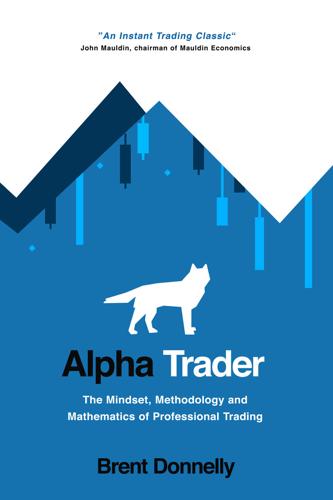
Alpha Trader
by
Brent Donnelly
Published 11 May 2021
The simultaneous collapse of stock prices and the decimalization of equity trading meant the highly-profitable strategies I employed in 1999/2000 were no longer profitable in 2002. Transaction costs are a constant drag on performance so you need a big edge to succeed in trading. Today, stock market trading is “free” in theory for many individuals. But you know the saying: if the product is free, then you are the product. In the past, you paid a transparent commission and the bid/offer spread. Now, you still pay the bid/offer spread and you pay a hidden transaction fee which is the profit earned by a high-frequency market maker which receives an ultra-short-term “free” option as it chooses how to execute your trade.
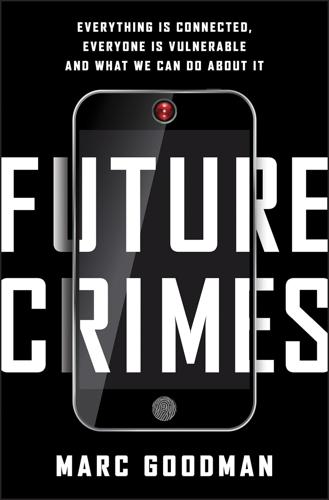
Future Crimes: Everything Is Connected, Everyone Is Vulnerable and What We Can Do About It
by
Marc Goodman
Published 24 Feb 2015
Hell awaits you perverts. Good luck singing there.” Facebook outed a closeted lesbian and caused her parents to disown her. In response to the irreparable harm she suffered, Bobbi was unequivocal in her stance: “I blame Facebook … It shouldn’t be somebody else’s choice what people see of me.” When you are the product of Internet and social media companies, the challenge you face is that data you provide in one context can be used in unexpected ways in another, with notable consequences. Such is the case with the highly popular “free” dating site OkCupid. Users seeking dates are asked to fill out questionnaires on the site, and most presume, wrongly, that the data they provide remain exclusively within the OkCupid system, used solely for the purposes of finding a suitable match for a date.
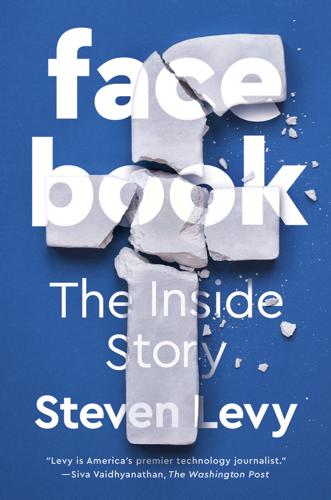
Facebook: The Inside Story
by
Steven Levy
Published 25 Feb 2020
Facebook, the complaint cited the dates that Kogan and Cambridge Analytica affirmed that the data was deleted. In its response on July 8, 2019, Facebook conceded that those dates were accurate. The company has confirmed this to me directly. raw data in Cambridge Analytica’s files: Matthew Rosenberg and Gabriel J. X. Dance, “‘You Are the Product’: Targeted by Cambridge Analytica on Facebook,” New York Times, April 8, 2018. Brad Parscale would later tell: Frontline’s The Facebook Dilemma web page has extended interviews with sources including Parscale. “secret sauce”: Nicholas Confessore and Danny Hakim, “Data Firm Says ‘Secret Sauce’ Aided Trump; Many Scoff,” New York Times, March 6, 2017.